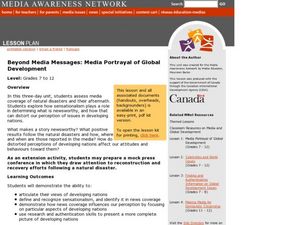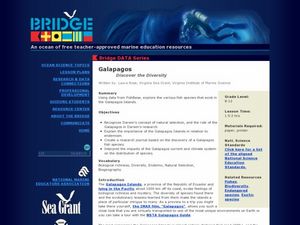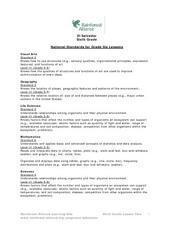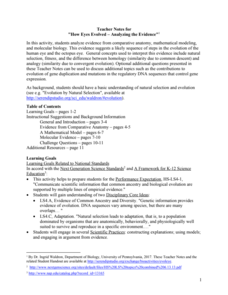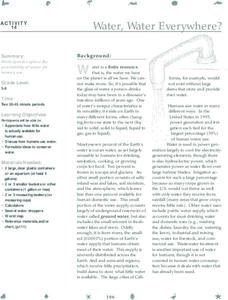Curated OER
Beyond Media Messages: Media Portrayal of Global Development
Students discuss global development and create a graphic representation of the discussion. In this media analysis lesson, students deconstruct disaster coverage by reading articles and identifying missing information. Students research...
Curated OER
Roots: The Ancestry of Modern People
High schoolers investigate the models for the origin of modern humans and the conditions that facilitate speciation and evolution. The classification and nomenclature of hominid species is also examined.
Curated OER
The Origin of Life: Alternative Views
Students explore the topics of faith and science as they relate to the origins of life. They consider the major points of Darwin's Theory of Evolution and brainstorm various explanations of how life began. Students investigate different...
Curated OER
Galapagos - Discover the Diversity
Pretend you are exploring a newly discovered species of fish in the Galapagos. Your budding marine biologists access FishBase Database's list of marine/brackish fishes and choose one to research. The link through this website does not...
Curated OER
Stressed Out!
Have your class engage in lessons on earthquakes. Learners explore the science behind earthquakes using interactive websites and video clips. Then, they review the layers and parts of the Earth before delving into the causes of...
Curated OER
Pride and Prejudice: Concept/Vocabulary Analysis
Clarify the setting, literary themes, and potential vocabulary issues with a concept analysis resource. With thoughtful explanations of many parts of Jane Austen's Pride and Prejudice, the reference sheet will be a great addition to your...
Curated OER
Arkansas Water Resources
Third graders examine Arkansas's major water resources. They discuss the difference between man-made and natural resources and what the resources are used for.
Royal Society of Chemistry
Separating Mixtures: How We Concentrate Natural Materials
Have your class look at a granite specimen and describe what they see. They should note three distinct components. Discuss mixtures with them and how they might be separated, then send them to the lab to figure out how to take apart five...
Curated OER
El Salvador: Whose Breakfast Isn't for the Birds?
Sixth graders investigate the understanding of where coffee is grown by conducting a survey. They study the natural history of coffee and examine bird habitats in the areas where coffee is grown. They write letters to explaining the...
Curated OER
You are the Archaeologist
Kids can practice their observation and evidence-based argument skills with a fun and engaging look at artifacts. With a given set of objects, each child will sketch and describe the object, then partners work together to determine...
Discovery Education
Cushion It!
Sugar cubes, collide! Groups design protection systems using bubble wrap to protect sugar cubes from being destroyed by falling batteries in the STEM lesson. They consider how the experiment relates to collisions in real-world...
Carolina K-12
Battle Behind the Pumps
After considering the role that gasoline plays in our lives and our dependence on it as a society, learners participate in a reading activity discussing why oil prices are increasing. They will then simulate being members of a committee...
Chicago Botanic Garden
Reflecting on What I Learned About Climate Change
After three eye-opening lessons about our environment, scholars revisit a 10-question survey, reflect on their new-found knowledge, and take action by writing to a representative or creating a public service announcement about climate...
NOAA
What Killed the Seeds?
Can a coral cure cancer? Take seventh and eighth grade science sleuths to the underwater drugstore for an investigation into emerging pharmaceutical research. The fifth installment in a series of six has classmates research the wealth of...
Pace University
Grades 9-10 Energy Sources
Alternative energy sources are becoming increasingly important. Learners have the opportunity to explore alternative energy sources using a differentiated instruction unit. They group together based on ability levels, assign roles to...
NASA
The Big Climate Change Experiment Lesson 2: The Influence of Climate on Culture
No conversation about culture is complete without considering climate. Scholars first view videos of climate witnesses who describe the climate in their regions and how climate change affects their daily lives. They then write essays or...
EngageNY
Building Background Knowledge: Competing Views Regarding Mining on Inuit Lands
Scholars build background knowledge about mining on Inuit lands. Working in small groups, they sort information about the Inuit onto a point of view chart to determine if mining is beneficial to Inuit communities.
Serendip
How Eyes Evolved – Analyzing the Evidence
Octopodes existed for hundreds of thousands of years before humans, yet our eyes share many similarities. Scholars analyze the evidence to determine if the evolution of eyes best fits a homology or analogy model. They discuss the issue...
Macmillan Education
Networking
"It's not what you know, it's who you know." Learners discuss and analyze this age-old adage by completing life skills worksheets, collaborative activities, and discussions regarding the nature of networking and how it may improve future...
Teach Engineering
What Does Light See?
The second installment of a seven-part series focuses on the refraction of light and how it affects the colors we see. Learners consider how this concept connects to biosensors for cancer detection.
Roy Rosenzweig Center for History and New Media
American Indians and their Environment
People could take a page in ingenuity and survival from the Powhatans. Deer skins became clothes, and the members of the Native American group farmed the rich Virginia soil and hunted in its forests for food. Using images of artifacts...
Curated OER
China's 'One Child Policy'
Students use an extract from Beth Gilligan's Voices and Values: Citizenship in Asia (Curriculum Corporation, 1998, pp 29-30), together with other resources, as the basis for investigation and analysis of China's 'one child policy'.
Teach Engineering
Hurricanes
When a levee fails, it means disaster. Introduce your class to hurricanes and the technologies used to help protect against them. The included presentation provides background information using Hurricane Katrina as a reference.
US Geological Survey
Water, Water, Everywhere?
Less than one percent of the earth's water is available for human use. A hands-on activity models the phenomenon for young scientists. Beginning with a specific volume of water, learners remove water that correlates to the percent of...


